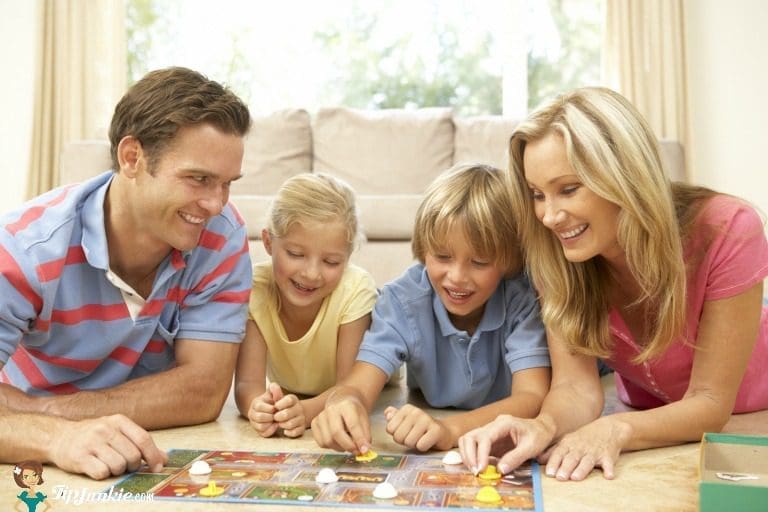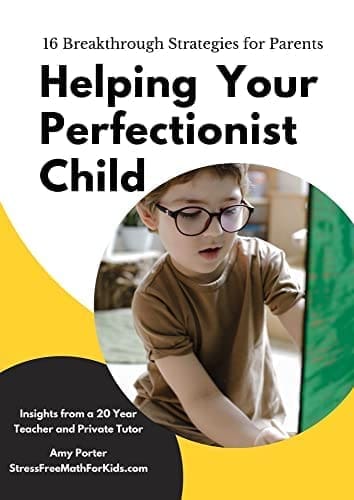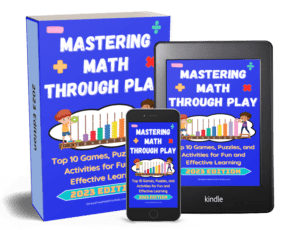Do you need strategies for helping your perfectionistic child? This post is a condensed version of an entire book I have written on this topic! If you find the content helpful, please get the full book in paperback or Kindle from here!
Persistence is a critical topic for any child to learn, but sometimes gifted students struggle with it the most since they expect things to come easily to them. When a task becomes challenging they will begin to question themselves and their own ability. The child may become terrified of failure. They may also not want to disappoint the adults or other children who they feel expect them to always perform well. They are often embarrassed to admit something is not easy for them. Then they may just give up on anything they can’t achieve perfection on and limit themselves on what they are willing to try.
It is important that we are able to help our children expand their patience for long term goals, their willingness to be wrong and to learn from their mistakes, and their ability to not have unrealistic expectations that things will always come easily.
Here are some ways I have found to do this:
Do experiments that are actually experiments!
When I first started teaching science I asked my brother, who is a veterinarian, if he had any advice. I will never forget him telling me how important it was that students do experiments that were actually experiments. “Most of what teachers call experiments are just a series of steps to follow where the teacher already knows exactly what will happen,” he said. “That’s not how real science works. In science you test out ideas and the majority of the time they don’t work the way you think they will. Then you figure out why and what you want to try differently.”
Teach children that if you want to learn new things you HAVE TO make mistakes.
Errors are a great way to learn. If you never make mistakes you never actually learn anything new- you just keep practicing what you already know how to do. I love the Shakira song from Zootopia (my son informed me it’s actually a Sia original) where she says:
Birds don’t just fly
They fall down and get up
Nobody learns without getting it wrong
I won’t give up
No, I won’t give in till I reach the end
Then I’ll start again
No, I won’t leave
I want to try everything
I want to try even though I could fail
I’ll keep on making those new mistakes
I’ll keep on making them every day
Those new mistakes

In their article Try Everything: Shakira Is Right Fee.org puts it like this:
On the individual level, our skills are improved with every attempt that ends in failure because we toss out the failed pattern in search of a new successful pattern. We don’t necessarily know the path forward. But trying strategies and failing at least gets us closer to what might be true, if only by the process of elimination. Our skills are trained. More importantly, our sense of judgment over what works and what doesn’t undergoes gradual refinement.
Stop praising performance and start praising persistence and perseverance.
It’s really easy to get caught up in saying things like “You are so smart!” or “I can’t believe how good you are at that.” Unfortunately that sometimes leads kids to believing they always have to be the best. As Jack D’Aurizio said, no matter how good you are, “You just have to wait for a reasonable amount of time, until finding someone way smarter / faster / more skilled than you.”
In my own experience I took a speech and debate class in high school where my teacher enthusiastically praised my results in my first class debate. She wanted me to join the debate team but I was afraid of not being able to perform as well as I did the first time. I knew there would be people better than me and I was afraid of disappointing my teacher and myself. In fact I became so stuck in my terror of letting her or myself down that I did not join the team, which I regret to this day.

Don’t let your kids win when you play games.
It’s fine to model how to play, or to partner with them when you first teach them a game. But you want them to experience what it is like to not be the best at something right away, to observe what others are doing, learn from them, and keep trying. When they do win it will be a real victory.
As a silly example, my 16 year old told me the other day how she had played the card game BS with a group of friends and they couldn’t believe how good she was. “That’s because my siblings never went easy on me and I had to learn to actually bluff,” she said. On the flip side I used to tutor a boy who got genuinely angry when he lost a game. “Do you always act like that when you lose?” I asked him. “I NEVER lose!” he responded. Well, guess what, everyone loses sometimes and it’s best you learn that from the beginning.
“Everyone remembers the kid in the playground who kicked the ball into the woods when he lost the game,” said pediatric psychiatrist Matthew Biel at Georgetown University Medical Center in an article in the The Wall Street Journal. “That kid wasn’t given the skills to recover from failure. “
Model and talk through how to deal with emotions and keep persevering.
I teach students to take a few deep breaths, label what they are feeling (example: “I feel frustrated”) and then talk about options that don’t involve quitting. “Should we take a break and go get something to eat?” “Do we know someone who might be able to help with this?” “Could we look up instructions or a tutorial?”
Coach your child through a challenge but don’t step in to save them.
As my daughter’s therapist taught me, when we step in to try to save a child it just teaches them that they don’t have the skills to do it themself, and undermines their confidence.
It is more important that you be a good role model. Model for your child how you deal with things that don’t come easily to you. Then talk them through those same strategies for themself.
For example, when I taught math classes at a learning center I was very aware the kids thought I was just “good at math.” I made sure that in addition to the other math we did math crafts that did NOT come easily to me (I do not have a craftsy bone in my body!) And I resisted the urge to practice them before class! I modeled for the kids how I would look back at the directions, break the challenge down step by step, not get frustrated if I needed to start over, and, yes, even let them help me. This was one of the ways I saw the BIGGEST growth in kids being willing to try things that were hard for them- they saw me do it too!
The other 4 strategies included with a lot of examples and details in my book are…
Use humor
Make sure your child knows their identity and self worth are not tied to their performance.
Read books about growth mindset with your child.
Seek professional help if needed.
The book also includes a Part 2 with 6 additional strategies specifically related to math.
For a preview of part 2 see this post.



